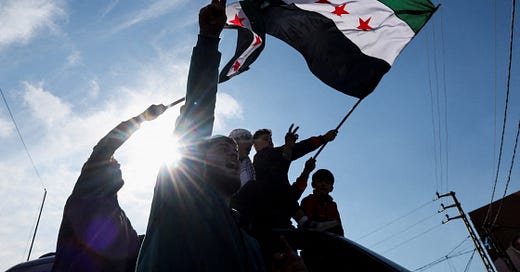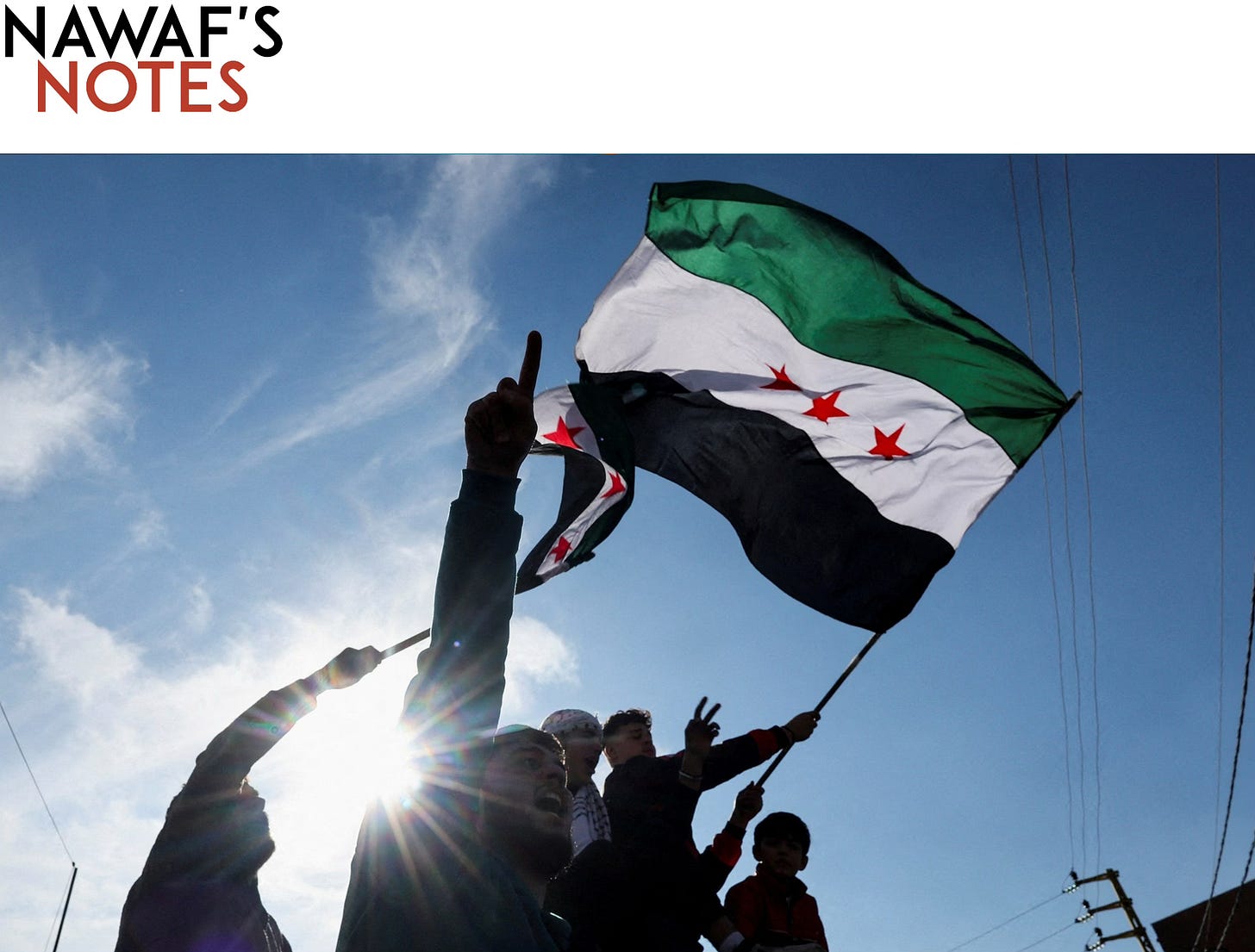Syria United? ... A Nation’s Future in Its People’s Hands
A new chapter unfolds for Syria, demanding unity, resilience, and collective action to build a brighter tomorrow.
The following is based on the author's original Arabic article published in Qatar’s Al-Raya Newspaper on December 11, 2024, 1…
The fall of Bashar al-Assad’s regime marks a pivotal moment in Syrian history. After years of relentless oppression and destruction, the Syrian people now face the monumental task of rebuilding their nation. What was once a distant hope, chanted in the streets by brave protesters risking their lives, now seems within reach: freedom, self-determination, and the possibility of a united Syria.
Yet, this is just the beginning of a long and arduous road. The collapse of Assad’s rule does not guarantee peace, stability, or prosperity. The wounds inflicted on Syria—both physical and emotional—run deep. Healing them will require unity, vision, and determination. The Syrian people must now take the reins of their destiny and steer their nation away from the dangers of fragmentation, foreign manipulation, and political chaos.
The Urgent Need for Unity
Perhaps the greatest challenge facing Syrians is maintaining the territorial and social unity of their country. More than a decade of war has left Syria deeply divided, with various factions controlling different regions. Any attempt to fracture the country further—whether through sectarian divides, regional partitions, or foreign-backed enclaves—would be a disaster not just for Syria, but for the entire region.
The lessons of other nations that have endured prolonged conflicts are clear: division breeds instability, and instability invites exploitation. Syria cannot afford to become a patchwork of competing interests or a proxy battleground for regional and global powers. Instead, Syrians must prioritize a comprehensive national dialogue that includes all voices, from urban elites to rural communities, and from the diverse ethnic and religious groups that make up the nation.
Unity does not mean uniformity. Syrians have learned the cost of authoritarian attempts to suppress diversity. A future Syria must embrace its pluralism as a strength, not a weakness. To rebuild trust, the country needs an inclusive political system that represents all its people and guarantees their rights.
A Cautionary Tale of Transitional Challenges
History offers many cautionary tales of the difficulties faced during transitional periods. From Iraq to Libya to Afghanistan, we have seen how the collapse of a regime can lead to chaos if not managed with care. Syria must avoid the traps of power struggles, institutional collapse, and external meddling that have plagued other post-conflict nations.
One of the first steps in this transition is preserving and reforming Syria’s national institutions. Institutions such as the civil service, judiciary, and military must be protected from collapse, even as they are purged of corruption and abuse. A functioning state is essential for providing basic services, maintaining order, and rebuilding public trust.
Another critical aspect of the transition is accountability. Syrians deserve justice for the crimes committed during the years of war. However, accountability must be balanced with reconciliation. Retributive justice alone cannot heal the deep scars left by the conflict. A truth and reconciliation process that acknowledges the pain of victims while fostering dialogue and understanding will be essential for building a sustainable peace.
The Role of Regional and International Actors
While the future of Syria ultimately belongs to its people, the role of regional and international actors cannot be ignored. Countries like Turkey, Iran, Russia, and the United States have all played a part in Syria’s war, often pursuing their own interests at the expense of Syrian lives.
Moving forward, the international community must shift its focus from competing over influence in Syria to supporting its recovery. This begins with respecting Syria’s sovereignty and refraining from imposing external solutions that fail to reflect the aspirations of its people.
Countries like Qatar have set an example by consistently advocating for a Syrian-led resolution to the conflict. Qatar’s steadfast support for the Syrian people and its commitment to dialogue and humanitarian assistance highlight the kind of constructive role that regional actors can play. Such efforts must be matched by broader international commitments, including increased humanitarian aid, funding for reconstruction, and diplomatic support for inclusive governance.
The United Nations also has a crucial role to play in facilitating the transition. By providing a platform for negotiations and monitoring progress, the UN can help ensure that the process remains fair and transparent. However, the effectiveness of international institutions depends on the genuine cooperation and goodwill of the global community—a factor that has too often been lacking in the Syrian context.
A Vision for Syria’s Future
Amid the challenges, there is hope. The Syrian people have demonstrated extraordinary resilience and courage over the past decade. Despite the horrors of war, they have kept alive the dream of a better future—a future where Syria is a united, sovereign, and democratic nation.
To achieve this vision, Syrians must prioritize three key goals:
1. Establishing a Representative Government:
The foundation of Syria’s future lies in a political system that reflects the will of its people. This means holding free and fair elections, drafting a new constitution, and forming a government that represents all segments of society. Women, minorities, and marginalized groups must have an equal voice in shaping the nation’s path forward.
2. Rebuilding the Economy and Infrastructure:
Years of conflict have devastated Syria’s economy and infrastructure. Rebuilding the nation will require significant investment, both from within and from the international community. Prioritizing projects that create jobs, improve education and healthcare, and restore essential services will be critical for fostering stability and growth.
3. Fostering National Reconciliation:
Healing the divisions within Syrian society will be a long and difficult process, but it is essential for lasting peace. Syrians must confront their painful past while working together to build a shared future. This includes addressing grievances, promoting forgiveness, and creating opportunities for dialogue and cooperation.
A Personal Reflection
As I reflect on Syria’s journey, I am reminded of the early days of the revolution, when hope and determination filled the streets. I remember imagining the moment when freedom would finally prevail, and the Syrian people could gather in the heart of Damascus to celebrate their triumph.
I pictured the citizens of a free Syria standing in the Umayyad Square, singing songs of unity and raising their flag high—a flag that symbolizes their struggle, resilience, and victory. That dream now feels closer than ever, but it is a dream that can only be realized through hard work, sacrifice, and a commitment to shared values.
The fall of Assad is not the end of Syria’s story; it is the beginning of a new chapter. This chapter will be written not by foreign powers or external actors, but by the Syrian people themselves. It is their courage, their determination, and their vision that will define what comes next.
Final Note …
Syria’s future is a test for all of us—not just for Syrians, but for the global community. Will we rise to the challenge of supporting a nation in its hour of need? Will we learn from the mistakes of the past and prioritize humanity over politics?
For Syria to succeed, it must remain one nation, united and free. Its people must have the freedom to choose their destiny and the opportunity to reclaim their place in the world.
As I close, I return to the words that have echoed through the hearts of Syrians for over a decade: freedom for all, no matter the cost. The road ahead is steep, but it is a road worth traveling.






